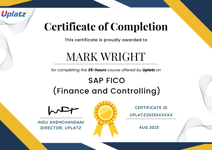
Product Manager Career Path
Self-paced videos, Lifetime access, Study material, Certification prep, Technical support, Course Completion Certificate
Uplatz
Summary
- Uplatz Certificate of Completion - Free
Add to basket or enquire
Overview
Uplatz provides this comprehensive Career Path program on Product Manager. It is a program covering all topics related to product management in the form of self-paced video tutorials. You will be awarded Course Completion Certificate at the end of the course.
Courses included in Product Manager Career Path Program are:
1. Product Management
2. Leadership and Management
3. Project Management
4. Business Finance and Financial Modeling
5. Financial Reporting and Accounting
A Product Manager is a professional responsible for overseeing the development and management of a product throughout its lifecycle. They act as the bridge between various teams, such as engineering, design, marketing, and sales, to ensure the successful creation and launch of products that meet customer needs and align with the company's overall strategy.
The responsibilities of a Product Manager can vary depending on the company, product, and industry. However, some common responsibilities include:
Product Strategy: Developing a clear product vision, defining goals, and creating a roadmap that outlines the product's direction and features.
Market Research: Conducting market analysis, understanding customer needs, and identifying opportunities to address market gaps.
Requirement Gathering: Collaborating with stakeholders, customers, and internal teams to gather and prioritize product requirements.
Product Development: Working with engineering and design teams to develop and deliver high-quality products that meet customer expectations.
Product Launch: Planning and executing successful product launches, including marketing strategies and communication plans.
Competitor Analysis: Monitoring and analyzing competitor products and strategies to maintain a competitive edge.
Customer Feedback: Gathering customer feedback, conducting user testing, and using data to make informed product decisions.
Product Performance Monitoring: Tracking product metrics and performance after launch to measure success and identify areas for improvement.
Cross-Functional Collaboration: Coordinating and communicating with different teams, such as engineering, design, marketing, sales, and customer support, to ensure alignment and smooth product development.
Product Lifecycle Management: Making decisions about product enhancements, updates, and end-of-life strategies.
Financial Analysis: Understanding and managing the product's financial performance, including revenue, costs, and profitability.
Risk Management: Identifying and mitigating potential risks that may impact the product's success or market position.
Stakeholder Communication: Regularly communicating updates, progress, and challenges to stakeholders, including executives and team members.
Innovation: Staying informed about industry trends, emerging technologies, and customer needs to drive continuous product innovation.
A successful Product Manager must possess strong leadership, communication, and organizational skills. They should have a deep understanding of their target market and be able to balance competing priorities to deliver products that achieve business objectives while meeting customer needs. Adaptability, problem-solving abilities, and a customer-centric mindset are essential traits for a Product Manager to excel in their role.
Course media
Description
The Product Manager career path is a dynamic and rewarding journey that involves gaining experience, developing leadership skills, and taking on increasing levels of responsibility in the product management domain. Here are the typical stages of a Product Manager's career path:
Entry-Level Product Coordinator/Assistant: Many Product Managers start their careers as Product Coordinators or Assistants. In this role, they support the Product Management team with tasks such as market research, data analysis, and documentation.
Associate Product Manager: As they gain experience, individuals may advance to the role of Associate Product Manager. They start to take ownership of smaller projects and collaborate with cross-functional teams to contribute to product development.
Product Manager: At this stage, professionals become full-fledged Product Managers. They lead product development initiatives, define product strategies, and take responsibility for the product's success in the market. They work closely with engineering, design, marketing, and other teams to execute the product roadmap.
Senior Product Manager: With demonstrated expertise and a track record of successful product launches, Senior Product Managers take on more significant and complex product portfolios. They lead strategic initiatives and are involved in high-level decision-making for the product line.
Group/Product Line Manager or Director of Product Management: This is a leadership role where the individual manages multiple products or product lines. They are responsible for setting overall product strategies, overseeing a team of Product Managers, and ensuring alignment with the company's business goals.
Director/Vice President of Product Management: At this executive level, individuals have substantial experience and accomplishments in product management. They provide strategic direction for all product-related activities, work closely with C-level executives, and have a significant impact on the company's growth and success.
Chief Product Officer (CPO): In some organizations, the highest level a Product Manager can reach is the CPO position. CPOs are responsible for the overall product vision and strategy across the entire company. They oversee all product management functions and play a critical role in driving innovation and business success.
Throughout the Product Manager career path, professionals may choose to specialize in particular industries or types of products, such as software, hardware, consumer goods, or services. They can also focus on specific aspects of product management, such as user experience (UX), product analytics, or product marketing.
Advancement in the Product Manager career path requires a combination of experience, leadership skills, a deep understanding of the market, and the ability to make data-driven decisions. Continuous learning, networking, and staying up-to-date with industry trends are essential for long-term success in this dynamic and ever-evolving field.
Who is this course for?
Everyone
Requirements
Passion and determination to learn and succeed!
Career path
- Product Manager
- Senior Product Manager
- Group Product Manager
- Director of Product Management
- Vice President of Product Management
- Chief Product Officer (CPO)
- Product Marketing Manager
- Technical Product Manager
- Product Development Manager
- Product Analytics Manager
- Product Strategy Manager
- Product Operations Manager
- Product Innovation Manager
Questions and answers
Currently there are no Q&As for this course. Be the first to ask a question.
Certificates
Uplatz Certificate of Completion
Digital certificate - Included
Course Completion Certificate by Uplatz
Reviews
Currently there are no reviews for this course. Be the first to leave a review.
Legal information
This course is advertised on reed.co.uk by the Course Provider, whose terms and conditions apply. Purchases are made directly from the Course Provider, and as such, content and materials are supplied by the Course Provider directly. Reed is acting as agent and not reseller in relation to this course. Reed's only responsibility is to facilitate your payment for the course. It is your responsibility to review and agree to the Course Provider's terms and conditions and satisfy yourself as to the suitability of the course you intend to purchase. Reed will not have any responsibility for the content of the course and/or associated materials.



